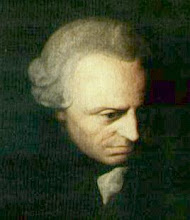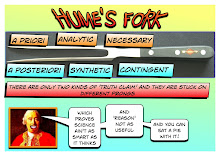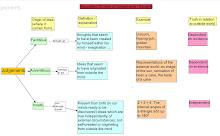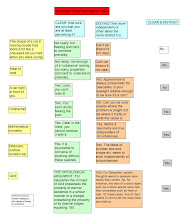Locke believed that ;
The state of Nature has a law of Nature to govern it, which obliges every one, and reason, which is that law, teaches all mankind who will but consult it, that being all equal and independent, no one ought to harm another in his life, health, liberty or possessions;
So Locke thinks that being rational creatures we should come to recognise the ‘law of nature’ that we all share basic equality and rights. He believes that these ‘natural laws’ are universal and apply to all people regardless of place or circumstance. His view is bound up with the belief that;
men being all the workmanship of one omnipotent and infinitely wise Maker; ... sent into the world by His order and about His business; they are His property, whose workmanship they are made to last during His, not one another’s pleasure.
It’s as if because God made us he owns all the rights to us and therefore we have no right to interfere with each other. This principle of owning things because you have worked to produce them is important to Locke, and we’ll come back to it below.
For Locke the big problem of living in the state of nature is the lack of someone unbiased and independent to help you preserve and exercise your these natural rights. The answer to this problem is to trade your right to judge and punish those that break the natural laws through a contract with others that establishes a government to act as a defender of your rights and judge any disputes that may occur.
Locke says, ‘in the state of Nature every one has the executive power of the law of Nature’ but that it is ‘unreasonable for men to be judges in their own cases [because] self-love will make men partial to themselves and their friends.’ Therefore ‘civil government is the proper remedy for the in- conveniences of the state of Nature, which must certainly be great where men may be judges in their own case’.
It is in the act of contracting with others that - agreeing the social contract - that we show our consent to be governed. And it is through our consent that the government can claim legitimate authority.
As ever things aren’t really that simple because the initial agreeing of the contract is a largely hypothetical idea, certainly it is pretty irrelevant to us that a ‘contract’ was made way back when. Of course there have been thousands of real contracts, real laws agreed between people and government over the hundreds of years since what we recognise as government came into being, and many of those laws still shape our lives. But what Locke and other ‘social contract’ theorists are interested in is the original justification of the very idea of having a system of government and law enforcement at all, and what must be the case for that government to claim to be legitimate.
Of course Locke realised that the legitimacy of a government’s authority could not rest on this original act of consent, but he believed that by living in a society and accepting the advantages that it gave us we were in effect giving our consent. This kind of consent he called ‘tacit consent’ and it is very important concept in political philosophy. The extent to which we might agree that we have given our consent to a government depends on the extent to which we feel we have any choice about participating in the facilities it provides. After all we don’t really individually opt to take advantage of the schools or healthcare the government provides, our parents make that decision for us; and the possibility of opting out, of abandoning the society of our birth is not very easy.
Hume mocked the idea of tacit consent, he compares it to the situation of someone ‘press-ganged’ into the crew of a ship, he says,
Can we seriously say, that a poor peasant or artizan has a free choice to leave his country, when he knows no foreign language or manners, and lives from day to day, by the small wages which he acquires? We may as well assert, that a man, by remaining in a vessel, freely consents to the dominion of the master; though he was carried on board while asleep, and must leap into the ocean, and perish, the moment he leaves her.
Hume’s basic point is still relevant even in contemporary societies where ‘peasants’ often have more economic power and opportunity for travel than he envisaged.
Anyway, getting back to the point, Locke’s view differs from Hobbes’ in that he sees humankind as capable of recognising the ‘natural’ rights of others. He sees the point of making a social contract as being a way of mutually defending and preserving these rights. Hobbes sees the contract as a means of basic protection from other people - a way of ensuring that we are free to build our lives and our communities free from the state of war that would exist without it.
A Note about Locke and Property
As we saw above, Locke makes a lot of the idea that we are God’s ‘workmanship’, suggesting that the ‘work’ of creating us establishes his right of ownership of us. Locke seems to extend this principle of owning things because you have worked to produce to people, claiming that;
As much land as a man tills, plants, improves, cultivates, and can use the product of, so much is his property. He by his labour does, as it were, inclose it from the common.
Locke places three conditions on property rights, he suggests that;
1) one may only appropriate as much as one can use before it spoils (Two Treatises 2.31)
2) one must leave “enough and as good” for others (the sufficiency restriction) (2.27)
3) one may (supposedly) only appropriate property through one's own labor (2.27).
These ideas are highly contentious (people are still arguing about what he really meant), they’re not too important for us yet, but I just thought I’d mention them.




















.jpg)







No comments:
Post a Comment